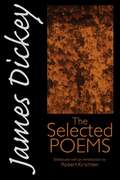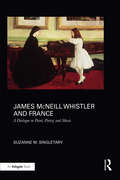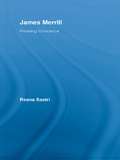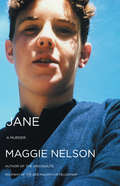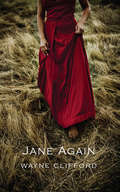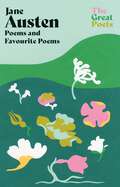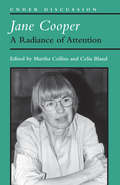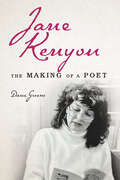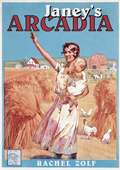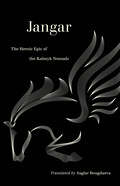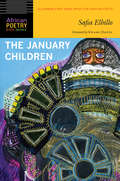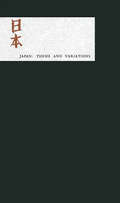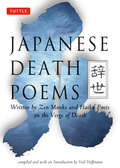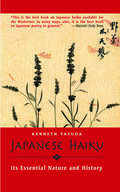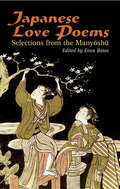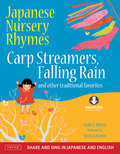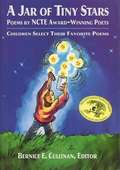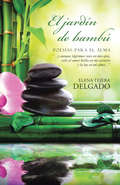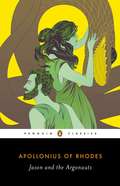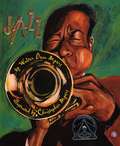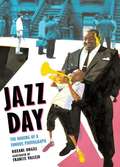- Table View
- List View
James Dickey: The Selected Poems (Wesleyan Poetry Series)
by Robert Kirschten James DickeyJames Dickey: The Selected Poems is the first book to collect James Dickey's very best poems. Like many visionary poets of the ecstatic imagination, Dickey experimented in a wide variety of literary styles. This volume brings together the finest work from each of the periods in Dickey's extremely controversial career. For over three decades, until his death in 1997, Dickey was one of the nation's most important poets; these are the poems that brought him a popular readership and critical acclaim.
James McNeill Whistler and France: A Dialogue in Paint, Poetry, and Music
by Suzanne SingletaryJames McNeill Whistler and France: A Dialogue in Paint, Poetry, and Music is the first full-length and in-depth study to position this painter within the overall trajectory of French modernism during the second half of the nineteenth century and to view the artist as integral to the aesthetic projects of its most original contributors. Suzanne M. Singletary maintains that Whistler was in a unique situation as an insider within the emerging French avant-garde, thereby in an enviable position to both absorb and transform the innovations of others – and that until now, his widespread influence as a catalyst among his colleagues has been neither investigated nor appreciated. Singletary contends that Whistler’s importance rivals that of Manet, whose multi-layered (and often unexpected) interconnections with Whistler are the focus of one chapter. In addition, Whistler’s pivotal role in linking the legacies of Baudelaire, Delacroix, Gautier, Wagner, and other mid-century innovators to the later French Symbolists has previously been largely ignored. Courbet, Degas, Monet, and Seurat complete the roster of French artists whose dialogue with Whistler is highlighted.
James Merrill: Knowing Innocence (Studies in Major Literary Authors)
by Reena SastriJames Merrill: Knowing Innocence reevaluates the achievement of this important poet by showing how he takes up an old paradigm – innocence – and reinvents it in response to new historical, scientific, and cultural developments including the bomb, contemporary cosmology, and the question of agency. The book covers Merrill’s full career, emphasizing the late poetry, on which there remains little commentary. Illuminating both Merrill’s relation to a tradition of literary innocence from Milton to Blake and Wordsworth to Emerson and Stevens, and his relevance to contemporary cultural debates, the rubric of "knowing innocence" helps us to understand his achievement. Merrill undertakes a career-long effort to know innocence, and develops a thematic and stylistic attitude that is both innocent and knowing, combining attitudes of wonder and hope with reflexive wit, intellectual breadth, and an unflinching gaze at mortality. He ultimately imagines innocence as creative agency, a capacity for imagination, invention, and ethical responsibility. The book demonstrates how, addressing questions of sexual identity, childhood and memory; atomic science, the big bang, and black holes; environmental degradation; AIDS; and the notion of the death of history – while honoring poetry’s essential qualities of freedom and play – his poems perform cultural work crucial to his time and ours.
Jane: A Murder (Soft Skull Shortlit Ser.)
by Maggie NelsonPart elegy, part true crime story, this memoir-in-verse from the author of the award-winning The Argonauts expands the notion of how we tell stories and what form those stories take through the story of a murdered woman and the mystery surrounding her last hours.Jane tells the spectral story of the life and death of Maggie Nelson’s aunt Jane, who was murdered in 1969 while a first-year law student at the University of Michigan. Though officially unsolved, Jane’s murder was apparently the third in a series of seven brutal rape-murders in the area between 1967 and 1969. Nelson was born a few years after Jane’s death, and the narrative is suffused with the long shadow her murder cast over both the family and her psyche.Exploring the nature of this haunting incident via a collage of poetry, prose, dream-accounts, and documentary sources, including local and national newspapers, related “true crime” books such as The Michigan Murders and Killer Among Us, and fragments from Jane’s own diaries written when she was 13 and 21, its eight sections cover Jane’s childhood and early adulthood, her murder and its investigation, the direct and diffuse effect of her death on Nelson’s girlhood and sisterhood, and a trip to Michigan Nelson took with her mother (Jane’s sister) to retrace the path of Jane’s final hours.Each piece in Jane has its own form, and the movement from each piece to the next--along with the white space that surrounds each fragment--serve as important fissures, disrupting the tabloid, “page-turner” quality of the story, and eventually returning the reader to deeper questions about girlhood, empathy, identification, and the essentially unknowable aspects of another’s life and death. Equal parts a meditation on violence (serial, sexual violence in particular), and a conversation between the living and the dead, Jane’s powerful and disturbing subject matter, combined with its innovations in genre, shows its readers what poetry is capable of--what kind of stories it can tell, and how it can tell them.
Jane Again
by Wayne CliffordIn his sixties, Yeats published the half-dozen poems that drew Crazy Jane out from his imagination to act as a profane voice against the strictures of the Church and the mores of his age. Wayne Clifford, in his sixties, has let Jane free to speak once more. We learn why Jane is crazy, if indeed she is.
Jane Austen: Poems both inspiring and witty from the author of 'Pride and Prejudice' and 'Emma' (The Great Poets)
by Jane Austen'Another world must be unfurled, Another language known'Best known - and beloved - for her highly popular novels including Pride and Prejudice, Emma and Sense and Sensibility, Jane Austen was also an accomplished, and often witty, poet:'I am going to have my dinner, after which I shan't be thinner'This collection, which also includes poems by the poets she herself admired, sheds light not only on Jane Austen the writer, but on the themes that are woven through her bestselling novels. Satirical, humorous and ironical, they will resonate both with readers who love her novels, and newcomers alike.'When stretched out on one's bed with a fierce throbbing head ... how little one cares for the grandest affairs''I am in a dilemma, for want of an Emma'
Jane Austen: Poems both inspiring and witty from the author of 'Pride and Prejudice' and 'Emma' (The Great Poets)
by Jane Austen'Another world must be unfurled, Another language known'Best known - and beloved - for her highly popular novels including Pride and Prejudice, Emma and Sense and Sensibility, Jane Austen was also an accomplished, and often witty, poet:'I am going to have my dinner, after which I shan't be thinner'This collection, which also includes poems by the poets she herself admired, sheds light not only on Jane Austen the writer, but on the themes that are woven through her bestselling novels. Satirical, humorous and ironical, they will resonate both with readers who love her novels, and newcomers alike.'When stretched out on one's bed with a fierce throbbing head ... how little one cares for the grandest affairs''I am in a dilemma, for want of an Emma'
Jane Cooper: A Radiance of Attention (Under Discussion)
by Martha Collins Celia BlandThough she published only five volumes of poetry over the course of her career, Jane Cooper (1924–2007) was deeply admired by her contemporaries, and teaching at Sarah Lawrence College for nearly forty years, she served as a mentor to many aspiring poets. Her elegant, honest, and emotionally and formally precise poems, often addressing the challenges of women’s lives—especially the lives of women in the arts—continue to resonate with a new generation of readers. Martha Collins and Celia Bland bring together several decades’ worth of essential writing on Cooper’s poetry. While some pieces offer close examination of Cooper’s process or thoughtful consideration of the craft of a single poem, the volume also features reviews of her collections, including a previously unpublished piece on her first book, The Weather of Six Mornings (1969), by James Wright, a lifelong champion of her work. Marie Howe, Jan Heller Levi, and Thomas Lux, among others, share personal remembrances of Cooper as a teacher, colleague, and inspiration. L. R. Berger’s moving tribute to Cooper’s final days closes the volume. This book has much to offer for both readers who already love Cooper’s work and new readers, especially among younger poets, just discovering her enduring poems.
Jane Kenyon: The Making of a Poet
by Dana GreeneDemystifying the “Poet Laureate of Depression” Pleasure-loving, sarcastic, stubborn, determined, erotic, deeply sad--Jane Kenyon’s complexity and contradictions found expression in luminous poems that continue to attract a passionate following. Dana Greene draws on a wealth of personal correspondence and other newly available materials to delve into the origins, achievement, and legacy of Kenyon’s poetry and separate the artist’s life story from that of her husband, the award-winning poet Donald Hall. Impacted by relatives’ depression during her isolated childhood, Kenyon found poetry at college, where writers like Robert Bly encouraged her development. Her graduate school marriage to the middle-aged Hall and subsequent move to New Hampshire had an enormous impact on her life, moods, and creativity. Immersed in poetry, Kenyon wrote about women’s lives, nature, death, mystical experiences, and melancholy--becoming, in her own words, an “advocate of the inner life.” Her breakthrough in the 1980s brought acclaim as “a born poet” and appearances in the New Yorker and elsewhere. Yet her ongoing success and artistic growth exacerbated strains in her marriage and failed to stave off depressive episodes that sometimes left her non-functional. Refusing to live out the stereotype of the mad woman poet, Kenyon sought treatment and confronted her illness in her work and in public while redoubling her personal dedication to finding pleasure in every fleeting moment. Prestigious fellowships, high-profile events, residencies, and media interviews had propelled her career to new heights when leukemia cut her life short and left her husband the loving but flawed curator of her memory and legacy. Revelatory and insightful, Jane Kenyon offers the first full-length biography of the elusive poet and the unquiet life that shaped her art.
Janey's Arcadia
by Rachel ZolfZolf's fifth book assembles a pirate score of accidental errancies from scanned source documents--missionary narratives, immigration pamphlets, historical writings--to decry the ongoing violence of colonial appropriation and the brutal scrubbing of Indigenous knowledges. It stars Janey Settler-Invader, a foul-mouthed mutant slouching toward the Red River, and a host of appropriations. 'A great hunger, ravenous as Canada, and filled with rage and hurt, animates Rachel Zolf's splendid new book. Janey's Arcadia brings us a few hundred years of western colonization.' --Kevin Killian
Jangar: The Heroic Epic of the Kalmyk Nomads
by Saglar BougdaevaThe first English translation of a Kalmyk epic nearly lost to history. This is the first English translation of Jangar, the heroic epic of the Kalmyk nomads, who are the Western Mongols of Genghis Khan’s medieval empire in Europe. Today, Kalmykia is situated in the territory that was once the Golden Horde, founded by the son of Genghis Khan, Juchi. Although their famed khanates and cities have long since disappeared under the sands of the Great Eurasian Steppe, the Kalmyks have witnessed, memorized, and orally transmitted some of the most transformative developments, both victorious and tragic, in the history of civilizations. A tribute to the protectors of the mythical country Bumba, Jangar reflects the hopes and aspirations of the Kalmyk people as well as their centuries-long struggle for their cultural existence. This new English translation is more than a tribute to the artistic creativity and imagination of the Kalmyk people—it is also an important step in their struggle for cultural survival. It was only after centuries of oral transmission that the songs and stories surrounding Jangar were written down. When the first translation, into Russian, finally appeared, Stalin had the entire Kalmyk population deported to Siberia and ordered that their national literature be eliminated from the published world. This Soviet repression has had enormous consequences for world literature, silencing nomadic voices and keeping hidden their distinctive contributions. Making Jangar available in English is a landmark event, bringing a lost classic to the world’s attention and restoring the voices of an almost-erased tradition at the heart of the history of Eurasia.
The January Children (African Poetry Book)
by Safia Elhillo Kwame DawesIn her dedication Safia Elhillo writes, “The January Children are the generation born in Sudan under British occupation, where children were assigned birth years by height, all given the birth date January 1.” <P><P>What follows is a deeply personal collection of poems that describe the experience of navigating the postcolonial world as a stranger in one’s own land. <P><P>The January Children depicts displacement and longing while also questioning accepted truths about geography, history, nationhood, and home. The poems mythologize family histories until they break open, using them to explore aspects of Sudan’s history of colonial occupation, dictatorship, and diaspora. <P><P>Several of the poems speak to the late Egyptian singer Abdelhalim Hafez, who addressed many of his songs to the asmarani—an Arabic term of endearment for a brown-skinned or dark-skinned person. Elhillo explores Arabness and Africanness and the tensions generated by a hyphenated identity in those two worlds. No longer content to accept manmade borders, Elhillo navigates a new and reimagined world. <P><P>Maintaining a sense of wonder in multiple landscapes and mindscapes of perpetually shifting values, she leads the reader through a postcolonial narrative that is equally terrifying and tender, melancholy and defiant.
Japan: A Collection of Poems by Americans
by Charles E. TuttleThis collection of Japanese poetry contains over 200 poems by some 153 Americans writing of their impressions and experiences of Japan.<P><P>If Japan forms the theme of the poems collected here, the variations are certainly the deep feeling so many Americans have come to have for Japan and the Japanese People. And the Resulting Choral is, we are convinced, both a thing of beauty and unique expression of goodwill between nations.Through the many years and in many countries poets have been entranced with the romances suggested by the name Japan. They have enthralled the sweetness of its children; serenity of its art; the beauty of its fields, seas, and mountains; the grandeur of its ancient architecture and quiet gardens; colorful pageantry of its history and deep emotions of its drama; the industriousness of its workers, charm of its women, and indomitable character of its people.
Japanese Death Poems
by Yoel Hoffmann"A wonderful introduction the Japanese tradition of jisei, this volume is crammed with exquisite, spontaneous verse and pity, often hilarious, descriptions of the eccentric and committed monastics who wrote the poems."-Tricycle: The Buddhist ReviewAlthough the consciousness of death is, in most cultures, very much a part of life, this is perhaps nowhere more true than in Japan, where the approach of death has given rise to a centuries-old tradition of writing jisei, or the "death poem." Such a poem is often written in the very last moments of the poet's life.Hundreds of Japanese death poems, many with a commentary describing the circumstances of the poet's death, have been translated into English here, the great majority of them for the first time. Yoel Hoffmann explores the attitudes and customs surrounding death in historical and present-day Japan, and gives examples of how these have been reflected in the nation's literature in general. The development of writing jisei is then examined-from the poems of longing of the early nobility and the more "masculine" verses of the samurai to the satirical death poems of later centuries. Zen Buddhist ideas about death are also described as a preface to the collection of Chinese death poems by Zen monks that are also included. Finally, the last section contains three hundred twenty haiku, some of which have never been assembled before, in English translation and romanized in Japanese.
Japanese Haiku
by Peter BeilensonTwo hundred twenty examples of seventeen-syllable poems translated from the Japanese, including such authors as Basho, Buson Issa, Shiki, Sokan, Kikaku, and others.
Japanese Haiku
by Kenneth YasudaThis is the most authoritative and concise book on Japanese haiku available: what it is, how it developed, and how it is practiced in both Japanese and English. While many haiku collections are available to Western readers, few books combine both translated haiku with haiku written originally in English, along with an analysis of individual poems and of the haiku form itself. Written by a leading scholar in the field--Kenneth Yasuda was the first American to receive a doctorate in Japanese literature from Tokyo University--Japanese Haiku has been widely acclaimed. This edition is completely repackaged for 2002, and is the perfect book for lovers of poetry who do not have a solid background in haiku.
Japanese Haiku
by Kenneth YasudaThis is the most authoritative and concise book on Japanese haiku available: what it is, how it developed, and how it is practiced in both Japanese and English. While many haiku collections are available to Western readers, few books combine both translated haiku with haiku written originally in English, along with an analysis of individual poems and of the haiku form itself. Written by a leading scholar in the field--Kenneth Yasuda was the first American to receive a doctorate in Japanese literature from Tokyo University--Japanese Haiku has been widely acclaimed. This edition is completely repackaged for 2002, and is the perfect book for lovers of poetry who do not have a solid background in haiku.
Japanese Love Poems: Selections from the Manyoshu
by Evan BatesKnown as the "Collection of Myriad Leaves," or the "Collection for a Myriad Ages," the Manyoshu is Japan's most significant early anthology of poetry. The poems date from the eighth century and earlier, and their simplicity and sincerity offer glimpses of a literary culture beginning to define itself.The Manyoshu is virtually silent on the topics of war and the martial spirit; explorations of the many forms of love, however, appear throughout the collection's more than 4,000 poems. The poems selected for this volume comprise paeans to conjugal love, celebrations of intense filial piety and the love between brothers and sisters, descriptions of the fierce competition for spouses, and tributes to forbidden attachments. The Manyo poets wrote in a primitively vital and sensuous language as they experimented with form and subject.
Japanese Nursery Rhymes
by Danielle Wright Helen Acraman2012 Creative Child Magazine Media of the Year Award Winner!What better way to learn a new language than through rhymes and music?Everywhere in the world, there are poems and songs especially for children--rhymes that are sung from generation to generation and never forgotten. In Japan, nursery rhymes speak of nature, of everyday joys and of Japan's own special culture. In Japanese Nursery Rhymes fifteen well-loved verses are colorfully presented in a format that makes language learning easier. The included audio CD features kids singing in both Japanese and English--songs so lively and sweet you'll find yourself singing along!For preschoolers and beyond, this book will be a joy to the mind, the eye, the ear and the heart.
Japanese Nursery Rhymes: Carp Streamers, Falling Rain and Other Traditional Favorites (Share and Sing in Japanese & English; includes Downloadable Audio)
by Danielle Wright Helen Acraman**2012 Creative Child Magazine Media of the Year Award Winner!**A delightful collection of fifteen well-loved rhymes, Japanese Nursery Rhymes is the perfect introduction to Japanese language and culture for young readers.What better way to learn the Japanese language than through rhymes and music. This beautifully illustrated multicultural book features songs and rhymes in both English and Japanese. Accompanied by an audio CD with recordings of kids singing in both languages - songs so fun and charming, it will be nearly impossible for you not to sing along!Favorite Japanese songs and rhymes include: My Hometown Bubbles The Rabbit Dance The Cradle Lullaby and many more!For preschoolers and beyond, this book will be a joy to the mind, the eye, the ear and the heart.
A Jar of Tiny Stars
by Bernice E. CullinanA sample of poems by poets who have received the National Council of Teachers of English Award for Poetry for Children, including David McCord, Aileen Fisher, Karla Kuskin, Myra Cohn Livingston, Eve Merriam, John Ciardi, Lilian Moore, Arnold Adoff, Valerie Worth, and Barbara Esbensen.
El jardín de bambú: Poesías para el alma
by Elena Tejera Delgado<P>«Una lectura para recorrer sin prisas, disfrutando de la serenidad que transmite cada rincón.» <P>Con un estilo poesía mística-crecimiento personal, El jardín de bambú ofrece un recorrido desde el pensamiento emocional hasta los anhelos del alma, en forma, muchas veces, de conversaciones, donde las preguntas y respuestas son parte del aprendizaje y evolución personal. <P>Desde los miedos, dudas e inseguridades hasta la valentía que proporciona la aceptación de la propia debilidad, da una visión siempre esperanzadora y auténtica de la realidad del ser humano.
Jason and the Argonauts
by Benjamin Acosta-Hughes Aaron Poochigian Apollonius Of RhodesThe first new Penguin Classics translation of the Argonautica since the 1950sNow in a riveting new verse translation Jason and the Argonauts (also known as the Argonautica), is the only surviving full account of Jason's voyage on the Argo in quest of the Golden Fleece aided by the sorceress princess Medea. Written in third century B.C., this epic story of one of the most beloved heroes of Greek mythology, with its combination of the fantastical and the real, its engagement with traditions of science, astronomy and medicine, winged heroes, and a magical vessel that speaks, is truly without exact parallel in classical or contemporary Greek literature and is now available in an accessible and engaging translation.
Jazz
by Walter Dean MyersFather and son team Walter Dean Myers, author, and Christopher Myers, illustrator, create a book of rhyming text and illustrations which celebrate the roots of jazz music.
Jazz Day: The Making Of A Famous Photograph
by Roxane Orgill Francis VallejoWhen Esquire magazine planned an issue to salute the American jazz scene in 1958, graphic designer Art Kane pitched a crazy idea: how about gathering a group of beloved jazz musicians and photographing them? He didn’t own a good camera, didn’t know if any musicians would show up, and insisted on setting up the shoot in front of a Harlem brownstone. Could he pull it off? In a captivating collection of poems, Roxane Orgill steps into the frame of Harlem 1958, bringing to life the musicians’ mischief and quirks, their memorable style, and the vivacious atmosphere of a Harlem block full of kids on a hot summer’s day. Francis Vallejo’s vibrant, detailed, and wonderfully expressive paintings do loving justice to the larger-than-life quality of jazz musicians of the era. Includes bios of several of the fifty-seven musicians, an author’s note, sources, a bibliography, and a foldout of Art Kane’s famous photograph.
